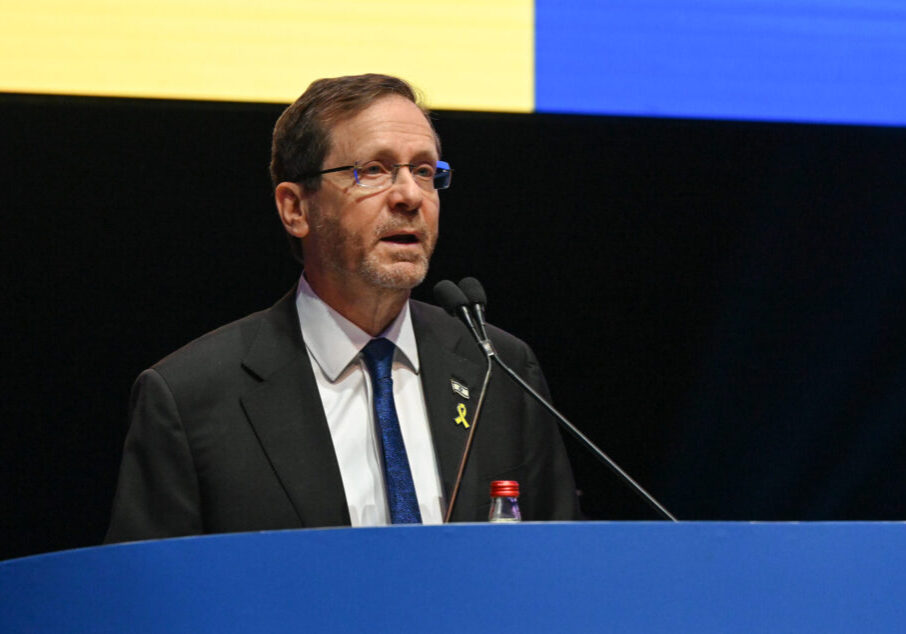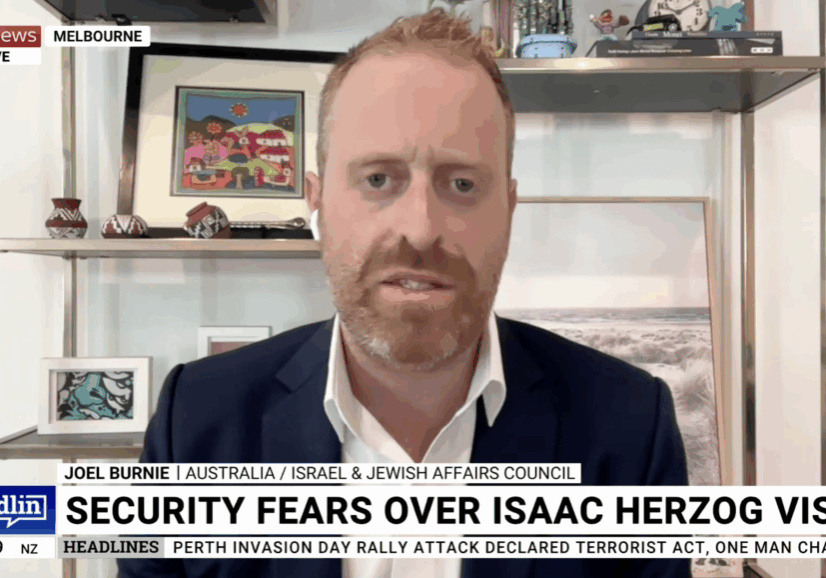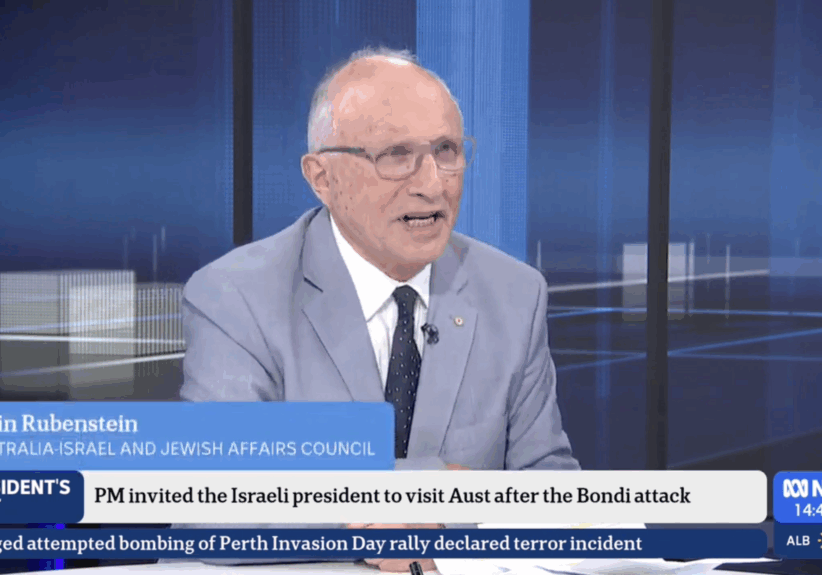Australia/Israel Review
Noted and Quoted – June 2018
Jun 7, 2018 |

Right? Wrong!
Hamas was successful in convincing media outlets to uncritically report the purported justification for its six-week campaign of ‘protests’ was to exercise the so-called Palestinian “right of return” to present day Israel.
For example, the Hobart Mercury, Courier Mail and Advertiser (April 29) all had a story which stated that “marchers are demanding the right to return to their homes seized by Israel in 1948.”
In the overwhelming number of cases Israel did not “seize” Palestinian Arab homes. The majority voluntarily left their homes without encountering Israeli forces, their departure prompted by a number of factors, including their own leaders telling them to do so.
It was the Arab side’s rejection of the UN Partition Plan and launching of a war to destroy the Jewish state which caused the refugee problem.
Media disarms Hamas
The 62 Palestinians killed along the Gaza-Israel border on May 14 were often portrayed as having died from indiscriminate shooting by Israel.
News Ltd’s Ellen Whinnett reported (May 16) that “59 people were killed when Israel opened fire on Palestinians along the Gaza border protesting against the opening of the new embassy in Jerusalem.”
The Australian Financial Review and Age (May 16) ran an analysis from New York Times columnist Michelle Goldberg that called the deaths a “massacre”.
As it became clearer most of the dead were not innocent civilians, there was little follow up.
Honourable exceptions included a Daily Telegraph report (May 18) of “senior Hamas official Salah Bardawil[‘s]” admission on “Baladna TV” that “50 out of the nearly 60 protesters killed on Monday were Hamas members, with the others being ‘from the people.'”
SBS reported Bardawil’s admission but it appears that the ABC didn’t.
The Age and SMH buried Hamas’ admission in a report on May 18.
On May 16, the papers’ joint editorial still called the Palestinian protesters killed on May 14 “unarmed protesters”.
On May 19, days after Hamas admitted those killed were mostly its fighters, ABC Radio National host Geraldine Doogue was still falsely referring to “the deaths of more than 60 unarmed Palestinian protestors.”
Odd MacDonald
ABC Radio National “Breakfast” host Hamish Macdonald was adamant that he knew Israel’s response on May 14 was unjustified.
Macdonald asked AP Middle East correspondent Joe Federman (May 15) “how can Israel justify responding with snipers in response to people throwing stones?”
Federman said “their fear…is that Hamas militants are hidden among these crowds and if there’s a large number of people crossing through that they’re going to break away and maybe go into these villages…So they look at this as, you know, as a threat.”
The next day – May 16 – Macdonald interviewed retired Israeli Defence Forces Col. Eran Lerman and was even more blunt in claiming Israel used “indiscriminate” force.
Macdonald argued that a 14-year-old Palestinian boy killed was “target[ted]” but Lerman pointed out that “he was probably in the group of young men and running with them.”
Lerman explained that Israel “cannot take the risk that a group of people directly assaulting the fence were actually coming to deliver flowers in Israeli villages on the other side.”
In which case, Macdonald insisted “if you don’t know, then the killing can only be described as indiscriminate, if you don’t know who it is that you’re shooting at.”
Lerman said “we know what we’re shooting at. We’re shooting at the group of people assaulting the barrier. If they bring with them 14-year-olds, then they are involved in the war crime of bringing civilians in harm’s way in order to protect their activity.”
Lerman also insisted that Israel had “exhausted” every non-lethal option before resorting to live fire, explaining that “rubber bullets are not always effective… in a situation where you have thousands of people in an open space… as I said, they… kept on coming at 13 different points and some of those killed were certainly involved in direct terror activity.”
Proportionate response
On Sky News “AM Agenda” (May 16) AIJAC’s Jamie Hyams noted that people seem to think that proportionality means equal numbers killed on both sides but that is not the case. Proportionality, he explained to host Kieran Gilbert, means that an armed force needs to identify a legitimate military aim, such as Israel defending its border, and it can then use whatever force is necessary to achieve that aim, provided the civilian costs are not disproportionate to the military aim sought.
Poor choices
On May 17, the Age and Sydney Morning Herald made a poor story choice in running UK Telegraph correspondent Raf Sanchez’s emotive but not well balanced report on the death of eight-month-old Leila al-Ghandour allegedly during protests.
Sanchez reported the family’s claim that the child died after “inhaling a cloud of tear gas” during protests.
The report was by then out of date. On May 15, the Associated Press reported “an unnamed Gaza-based doctor as saying… that the baby had a pre-existing medical condition and that he did not believe her death was caused by the tear gas.”
In the Daily Telegraph (May 19), reporter Paul Toohey repeated the claim that the baby died by “teargas inhalation” but made the obvious point that the baby “never should have been on the front lines”. On ABC TV “Q&A” (May 21), ethicist Peter Singer said, “what kind of a person would you have to be to say, ‘I’m gonna take my baby to this area where there’s likely to be firing?'”
Waleed’s world
Channel 10’s “The Project” (May 15) ran a highly inflammatory segment on the May 14 violence. Co-host Waleed Aly said “despite witness accounts suggesting otherwise, both Israel and the US are blaming terrorist group Hamas for the violence.”
An animation ran of heavily armed Israeli soldiers and Palestinian stone throwers, as Aly ‘explained’ that the “clashes came as Israel celebrates the 70th anniversary of its founding” which the Palestinians call “the Nakba or catastrophe referring to the hundreds of thousands of Palestinians forced from their homes as a result.” The graphic then switched to a Palestinian mother carrying a baby.
Protests contextualised
Australian lawyer Arsen Ostrovsky, who now lives in Israel, said the protests were designed to tear down the border. “This was not a ‘peaceful protest’. It was a pre-meditated violent riot, planned and executed by Hamas. Regrettably, many in the international community, NGO world and media fell hook, line and sinker for Hamas’s PR spin,” Daily Telegraph (May 17).
In News Corp papers (May 17) and on his Sky News “Bolt Report” program (May 16) Andrew Bolt rallied to Israel’s defence, highlighting Hamas’ incitement to violence to show the protests were not intended to be peaceful and asking what critics of Israel would have done in similar circumstances.
But Adelaide Sunday Mail columnist Lainie Anderson (May 20) did not agree, responding, “I would have complied with my obligations under international law and refrained from using excessive force and live ammunition when there was no imminent threat. I would have tried every means, including water cannons, rubber bullets and tear gas, to subdue civilians armed not with guns but with slingshots and rocks.” Except Israel tried almost all those things, as Lerman explained on ABC radio.
Borderline
A rare exception to the media’s habit of ignoring Egypt’s role in enforcing a Gaza blockade was seen in the Age/SMH report (May 20) noting Hamas political leader Ismail Haniyeh was “hail[ing] Egypt’s rare gesture of goodwill toward Gaza in opening its border crossing at Rafah, on the southern edge of the territory, for the Muslim holy month of Ramadan…The opening would ease the 11-year-old blockade of Gaza, he said.”
On ABC TV “World” (May 14), Palestinian columnist Ramzy Baroud’s egregiously false statement that Israel does not let humanitarian aid into Gaza went unchallenged.
Palestinian activist Bassam Dally’s op-ed in the Australian (May 19) called for a global boycott of Israel, but despite noting Egypt enforces a blockade too, didn’t recommend a boycott of Egypt.
A let down
ABC Radio National “Saturday Extra” (May 19) host Geraldine Doogue’s questions to American Palestinian academic Rashid Khalidi on the 70th anniversary of Israel’s creation were disappointing.
Khalidi said the First Intifada was “largely, not entirely, non-violent, certainly they weren’t using weapons and explosives.”
Doogue quoted an American Israeli writer who castigated Israelis for believing that “Palestinian hostility to Jews is seen as absolute, eternal, and entirely independent of Israel’s own actions.”
Naturally, Khalidi “agree[d] entirely,” dismissing the role of antisemitism as a factor in Palestinian hostility to Israel’s existence.
Yet antisemitism has been prominent throughout the history of Palestinian Arab nationalism. Famously, Haj Amin al-Husseini, the preeminent 1920s to 1940s Palestinian Arab leader, not only promoted the antisemitic forgery “Protocols of the Elders of Zion” but offered his services to the Nazis in their quest to kill European Jewry.
Meanwhile, current PA leader Mahmoud Abbas received global condemnation, including from the Australian government, for a patently antisemitic speech on April 30 (see below) which reflected the ongoing antisemitism in Palestinian discourse today.
Yet both interviewer and interviewee seemed to suggest it was Israelis who are the real racists.
A delighted Doogue cited “that amazing statement I think it was [Israel’s first prime minister David] Ben-Gurion wasn’t it in 1948… this is ‘a land without a people for a people without a land.'”
Khalidi correctly noted Ben Gurion never said this and it was said much earlier “by Israel Zangwill who was quoting someone else” yet Doogue still suggested this reflected Zionism’s general attitude, comparing it to the 18th century British view of Australia as “terra nullius”.
Virtually all Zionist leaders and literature seriously discussed the presence of non-Jews in Palestine. For instance, they were a key subject of Herzl’s 1902 novel Altneuland, setting out a vision of a future Jewish state.
What Khalidi did not say and Doogue did not ask was whether he supports a two-state solution. His work makes it clear he does not.
Abbas’ antisemitism
Palestinian President Mahmoud Abbas’ statement in early May that European persecution of Jews did not happen “because of their religion, but rather their social role related to usury and banks” was reported on SBS TV “World News” (May 2).
The Daily Telegraph and the Courier Mail (May 5) ran Foreign Minister Julie Bishop’s condemnation of Abbas’ remarks.
Maybe if the ABC had bothered to cover Abbas’ antisemitic outburst, Doogue would have been better placed to be aware of the antisemitism in Palestinian discourse.
Editorial roundup
Israel’s 70th anniversary and the Gaza violence enticed the Age/Sydney Morning Herald (May 16) to reflect on why there is no Palestinian state.
The paper decided it is because of “Israel’s messy politics… that allows extreme and fundamentalist elements too much latitude to thwart mainstream opinion.”
Apparently it is not because the Palestinian Authority rejected three offers of a state and today refuses to negotiate.
In the same edition of the Age, Irish academic Brendan Ciaran Browne accepted at face value that the Gaza border protests are about “their right of return, a right that is protected under international law,” while blaming Israel entirely for the Palestinians not having a state.
A kind of balance
The Age (May 18) ran a heavily edited response to Browne from AIJAC’s Tzvi Fleischer that made the point “while for propaganda purposes Hamas says the march involves only ‘peaceful protest’, Monday’s events involved several shooting attacks on Israeli forces. There were also numerous pipe bombs and improvised explosive devices placed along the Gaza fence, several grenade attacks, kites with incendiary devices that set at least 23 fires inside Israel, and uncounted Molotov cocktail, slingshot and giant catapult attacks on Israel soldiers. Given all these circumstances, Israeli forces were always going to have to use significant force to prevent breaches of the border fence and protect nearby communities.”
B1 and B2
Israel-hater Greg Barns said “it is shameful and testament to the inhumanity of humankind that there is still no nation for Palestinians” yet stated that “in 1947 the United Nations proposed a partitioned Palestine. This was blocked by Arab leadership…In 1948 there was conflict. First between Arabs and Jews in Palestine and then a wider battle between Israel and Jordan, Egypt, Syria and Iraq.”
So, Arab leaders opposed the process that would’ve given them a state but aren’t to blame for its non-existence?
And the solution?
Barns quoted Israeli left-wing activist Uri Avinery saying a “practical solution must include at least a symbolic return of an agreed number of refugees to Israeli territory, a resettlement of the majority in the State of Palestine when it comes into being, and generous compensation to those who choose to stay where they are or emigrate elsewhere.”
You mean something like what Israel offered in 2000, 2001 and 2008 but which the PA leaders rejected? Mercury (May 14).
The next day the paper ran Tasmanian Professor Peter Boyce’s error filled piece which said the UN Partition Plan recommended “a Jewish state to coexist alongside a Palestinian state” but this “was shattered by Israel’s sensational victory in the six-day war of 1967.”
In 1947 – not 1967 – the Arabs rejected partition, launched a war which they lost and did not establish a Palestinian state on the territory they did control after the war’s end i.e. the West Bank and Gaza.
Boyce also painted a benevolent – and false – image of Hamas, saying its “primary objective since establishment in 1987 has been withdrawal of the Israeli occupying force.”
Jerusalem syndrome
On ABC TV “News 24” (May 14), AIJAC’s Colin Rubenstein was asked some bizarre questions on the move of the US Embassy to Jerusalem by an interviewer.
“You can understand the [Palestinians] fears and anxiety though. We’ve already seen hundreds of settlers raiding the Al-Aqsa mosque compound. Is this a signal that Palestinians who live in Jerusalem will soon be pushed out of their own homes?”
Rubenstein said, “there’s no such possibility at all….the Islamic authorities control the Islamic facilities in east Jerusalem.”
On SBS TV “World News” (May 14) Rena Sarumpaet gave a more nuanced picture of the supposed “raids”, saying Israeli police “had removed some young Jews who were praying [on the Temple Mount] in defiance of bans imposed for security reasons.”
Big deal?
US President Donald Trump’s decision to walk away from the Iran deal was welcomed by the Herald Sun (May 11) which quoted visiting retired Israeli army spokesperson Peter Lerner explaining that Iranian backed Hezbollah has 120,000 rockets and missiles aimed at Israel and the deal “rewarded Iran with the release of an estimated $100 billion back to the regime.”
Ahead of the decision, ABC Radio National “Breakfast” (April 26) favourite Iranian lobbyist Trita Parsi told Fran Kelly that the US, not Iran had violated the deal, accusing the West of selling billions of dollars of arms to Saudi Arabia which is “essentially engage[d] in a genocide in Yemen.”
Lowy Institute analyst Rodger Shanahan was not impressed either, putting forth questionable statements such as “The agreement came about because it was felt that the multilateral sanctions regime in place, while effective, could not be maintained forever.” Rubbish. President Obama badly wanted a deal and was willing to pay almost any price to achieve one before he left office; Australian (May 10).
In the Age (May 12), AIJAC’s Colin Rubenstein argued that in the wake of Trump’s announcement, “All interested parties, including the Australian government, now have the chance to support the diplomatic hard work needed to put in place new and more comprehensive arrangements” to deal with Iranian behaviour.
The Australian Financial Review ran AIJAC’s Allon Lee’s letter (May 15) responding to US analyst Stephen Walt’s ridiculous claim that Iran is disinterested in “regional dominance”. Lee noted Teheran boasts that it controls “Beirut, Damascus, Baghdad and Sana’a – while the Islamic Revolutionary Guard Corp openly says it wants to ensure Iranian control over a land corridor from the Persian Gulf to the Mediterranean Sea.”
Tags: Australasia, Australia
RELATED ARTICLES

Herzog visit an important expression of solidarity with our traumatised community: Joel Burnie on Sky News





